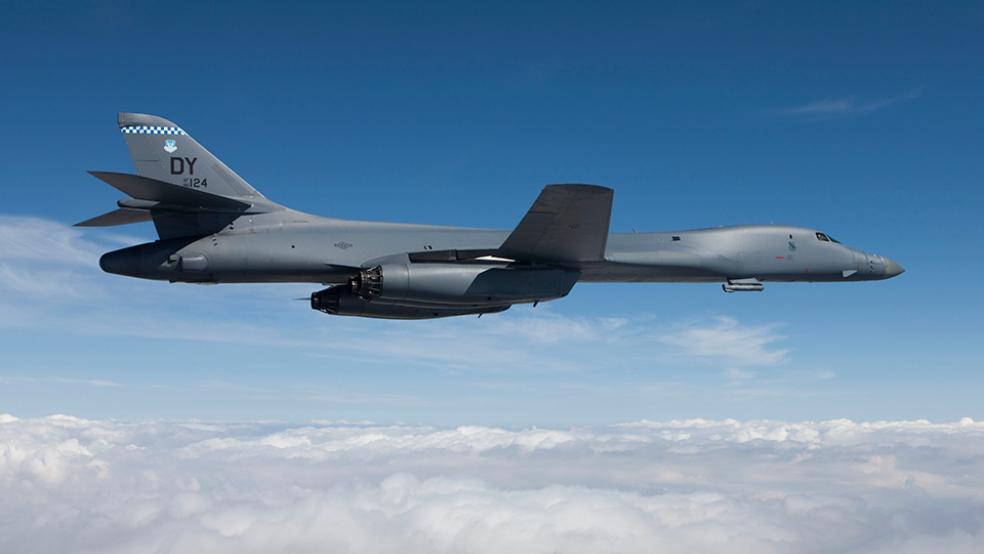In the coming weeks, the U.S. Air Force will announce the biggest defense deal of the decade. It will also be the last contract for a new manned combat aircraft for probably 20 years. (Tweet This)
Whoever wins the bid will have years' worth of manufacturing work. Whoever loses may have to exit the business of building piloted military aircraft.
The Long Range Strike-Bomber will replace an aging bomber fleet whose oldest aircraft go back to the Korean War. The Air Force has revealed little about what it wants out of the new bomber, but one thing is clear: it does not want an explosive price tag. The most recent bomber contract went to Northrop Grumman for the B-2, which first flew in 1989. The Pentagon purchased only 21 of the sleek, stealthy aircraft, at a cost of $2 billion each.
This time, the Air Force wants to buy up to 100 bombers and keep the price to $550 million per aircraft. Add in an estimated $20 billion for research and development, and the total value of the contract could close in on $80 billion. The new bomber should be airborne in 10 years.
Many wonder—with good reason, given the recent history of military aircraft contracts—whether the cost can really be kept to $550 million per plane. One strategy may be to build a plane that uses existing technology with an open architecture that allows future upgrades.
Northrop Grumman is again competing for the new bomber, and it's touting its experience in a slick commercial. "This is what we do," the ad says.
Read More: Boeing replaces CEO McNerney with Muilenburg
However, Northrop faces potent competition. Boeing and Lockheed Martin have teamed together for a rival bid. Boeing has experience ramping up aircraft manufacturing, and Lockheed has developed state-of-the-art stealth technology.
"Given the secrecy surrounding the program and the acquisition process, it is impossible to have an informed view on who will win, and there are compelling arguments both ways," writes Roman Schweitzer, a defense analyst at Guggenheim Securities.
Schweitzer speculates that if the Air Force imposes a fixed-price, incentive-free contract for the first 20 aircraft, it could favor "the deep pockets of the Boeing-Lockheed Martin team and allow them to be more aggressive on their proposal than Northrop may choose to be."
If Northrop loses, it would be a terrible blow to the company's aerospace systems division, especially after losing a major Air Force refueling tanker contract to Boeing in 2011.
"If Northrop were to lose, then this would likely stir expectations of further consolidation in the U.S. defense industry, with Northrop a potential seller down the line," writes Robert Stallard for RBC Capital Markets. That may not be a bad thing. "For Northrop's shareholders, this could be a heads-I-win, tails-you-lose situation." He has an "outperform" rating on the stock.
If Boeing loses, it will be a black mark for the company's incoming CEO. Some analysts have suggested Boeing may buy Northrop, but outgoing CEO Jim McNerney told Aviation Week this month "that is not a thought that has occurred to us."
Read More: China may buy 50-70 Airbus A330 jets
Both California and Florida are offering millions of dollars in tax creditsto become the manufacturing home for the new bomber. California may have the edge, even though the cost of doing business is higher there. Both teams already have established facilities in Palmdale, California, and last year the state offered $420 million in credits first to Lockheed, and then to Northrop, if they agree to build the bomber in the Golden State.
"Other states are luring what is ours and trying to take it from us," said California State Sen. Steve Knight. "If California is not competitive, then shame on us."
Lockheed Martin may be a winner either way. It still has the mammoth F-35 Joint Strike Fighter program, and while being part of the new bomber team would obviously boost its bottom line even more, "a loss may have some value as well," writes Guggenheim's Schweitzer. Losing would help "one of the company's largest suppliers and frequent partners (Northrop) stay healthy and would hurt one of its biggest strategic competitors (Boeing)."
This story originally appeared on CNBC.com.




